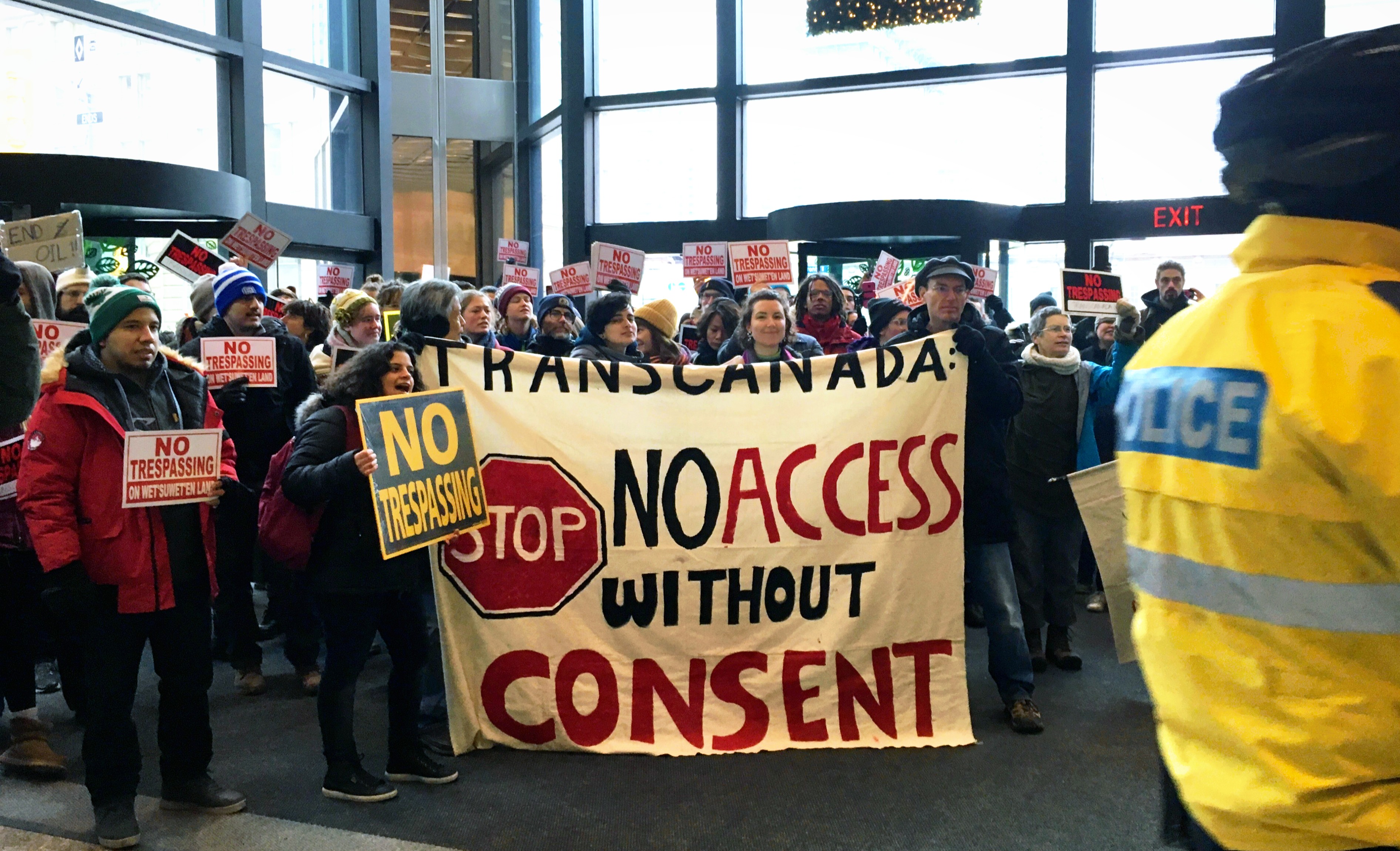On December 10, International Human Rights Day, at the same time as the Unist’ot’en people began a fight in British Columbia’s courts against TransCanada’s injunction, hundreds gathered in Toronto in solidarity to protest at TransCanada’s office.
The Toronto protest coincided with the start of a hearing in Prince George in which TransCanada is seeking an injunction asking for police to arrest and remove those “occupying, obstructing, blocking, physically impeding, or delaying access” to TransCanada. The company is attempting to force through their Coastal GasLink pipeline on unceded and unsurrendered Unist’ot’en territory. The $6.2 billion pipeline is part of the largest fracking project in the country’s history, which plans to carry natural gas from Dawson Creek in northeastern BC to the proposed LNG Canada processing plant near Kitimat off the coast of BC.
Granting TransCanada’s injunction would violate Wet’suwet’en collective title, and the United Nations Declaration on the Rights of Indigenous Peoples (UNDRIP), which Canada pledged full support for in May 2016. The injunction court proceedings started today at a BC court in Prince George.

Eve Saint addresses the crowd and employees inside the foyer of TransCanada’s Toronto office. Photo by Rodrigo Castro.
At the Toronto action, over 150 people entered the building of TransCanada’s Toronto office at 200 Bay Street, and delivered an oversize ‘trespass notice’ to TransCanada for their attempt to force through the Coastal GasLink pipeline on unsurrendered unceded Unist’ot’en Indigenous territory. Indigenous community members and supporters took over the lobby with drumming and a round dance.
Eve Saint, Wet’suwet’en water and land protector said, “Now is the time to get behind Indigenous resistance. Because industry falls on our doorstep, falls on our shoulders, and makes us sick, poisons us. You want to do something about climate change? Get behind Indigenous resistance. Now is the time and it’s critical.”
Naila Lalji, one of the rally organizers, explained “we protested at TransCanada’s Toronto office today to make sure that wherever TransCanada works they get the message loud and clear that they are not welcome on Wet’su’wet’en lands, and that people across Turtle Island are paying attention and will hold them to account.”

Gein Wong drums outside of TransCanada’s Toronto office. Photo by Gabriel Proaño.
The protest was coordinated by Toronto Unist’ot’en Solidarity, a coalition of organizations acting in solidarity with Unist’ot’en Camp. Funds are also being collected to support the camp’s legal costs. Donations can be made online here.
 Photo by Gabriel Proaño.
Photo by Gabriel Proaño.
Background on the Unist’ot’en
In the 1997 Delgamuukw vs British Columbia case, the Wet’suwet’en’s traditional title to 22,000 square kilometres of land was legally affirmed. The courts have defined Aboriginal title as Indigenous people’s exclusive right to the land, including exclusive land-use and resource rights. The people of Unist’ot’en (a Wet’suwet’en clan) have been peacefully occupying their traditional territory to both create a healing space for Wet’suwet’en people, as well as ensure that their lands be protected from toxic pipelines. The Wet’suwet’en hereditary chiefs all oppose the building of pipelines through their sovereign territory, and have committed to defending their land against the energy companies attempting to violate their land rights.
Background on Proposed TransCanada Pipeline
Coastal Link Gas is a subsidiary of the TransCanada Pipeline Inc, and the pipeline they are attempting to force through Unist’ot’en Camp is part of a $40 billion liquified natural gas plant, which will be processing fracked gas. Wet’suwet’en hereditary chiefs have repeatedly rejected the pipeline, and asserted that Wet’su’wet’en lands are unceded and unsurrendered, therefore the governments of Canada and British Columbia have no jurisdiction to force the project through. TransCanada has claimed that this shouldn’t be an issue as they are not seeking access to the camp itself, but it is the 22,000km2 that the Unist’ot’en camp is committed to protecting.
Help make rabble sustainable. Please consider supporting our work with a monthly donation. Support rabble.ca today for as little as $1 per month!





